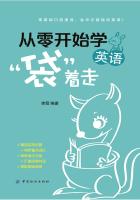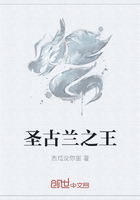Now I do not for a moment mean to disparage3, business. My whole point is that it was not for me. I went into it for money, and aside from the satisfaction of being able to help the family, money is all I got out of it. It was not enough. I felt that life was passing me by. From being merely discontented I became acutely miserable. My one ambition4 was to save enough to quit and go to Europe to study music. I used to get up at dawn to practice before I left for "down-town", distracting my poor mother by bolting a hasty breakfast at the last minute. Instead of lunching with my business associates, I would seek out some cheap cafe, order a meager meal and scribble my harmony exercises. I continued to make money, and finally, bit by bit, accumulated enough to enable me to go abroad. The family being once more solvent, and my help no longer necessary, I resigned from my position and, feeling like a man released from jail, sailed for Europe. I stayed four years, worked harder than I had ever dreamed of working before and enjoyed every minute of it.
"Enjoyed" is too mild a word. I walked on air. I really lived. I was a free man and I was doing what I loved to do and what I was meant to do.
If I had stayed in business I might be a comparatively wealthy man today, but I do not believe I would have made a success of living. I would have given up all those intangibles, those inner satisfactions that money can never buy, and that are too often sacrificed when a man' s primary goal is financial Success.
When I broke away from business it was against the advice of practically all my friends and family. So conditioned are most of us to the association of success with money that the thought of giving up a good salary for an idea seemed little short of insane. If so, all I can say is "Gee, it' s great to be crazy."
Money is a wonderful thing, but it is possible to pay too high a price for it.
我必须先对自己的经历作个简短的介绍,以便说明我的信仰。
放弃前途远大的商业生涯,转而学习音乐,这成为了我人生的转折点。虽然我的父母和我一样热爱音乐,但他们不同意我以音乐为生。从我的家庭背景来看,这一点是可以理解的。我的祖父在莫比尔的斯普林希尔学院从事了长达40年的音乐教学,虽然深受全院师生的喜爱与尊敬,但微薄的收入仅能勉强维持一家人的生活。父亲常说,如果不是祖母精打细算,勤俭持家,一家人早就喝西北风了。结果便是,在我们的家里,只要提及音乐这个职业,大家的眼前就会浮现出那种收入朝不保夕的苦日子。父母不让我上音乐学院,坚持让我上大学,于是我上了大学——我还记得自己当时很开心,因为我虽然热爱小提琴,并将大部分业余时间用来练琴,但我对其他许多事也很感兴趣。
在我从哥伦比亚大学毕业之前,家中出现了经济危机,我觉得自己有责任退学找工作。于是,我投身商界,不过我总觉得那些日子简直是在浪费生命。
我并不是在贬低经商,而是在说它并不适合我。我经商是为了赚钱,除了贴补家用为我带来一点满足感之外,我所能得到的一切就是钱。但这并不够。我觉得时光正从我的身边溜走。对职业的不满使得我痛苦不堪。我唯一的愿望就是挣够钱,然后辞职去欧洲学习音乐。因此,我常常早起练琴,然后去市区上班,匆忙中都来不及吃仓促准备的早餐,这使可怜的妈妈担忧不已。我不与业务合作人共进午餐,而是找个便宜的咖啡馆,随便吃点东西,写写和音练习曲。我不断地挣钱,终于,一点一点地攒够了出国的费用。家中的经济压力也有所缓解,不再需要我的帮助。我放弃了商业生涯,那感觉就像刚获释的犯人一样,然后我漂洋过海去了欧洲。这一去便是4年,我的学习比以前想象的还要刻苦,却很快乐。
“快乐”还不足以形容我的心情。我变得乐不思蜀,飘飘欲仙。我感觉自己是在真正地生活。我成为了一个自由人,做着自己喜欢且注定要做的事。
如果我一直留在商界,现在也许是一个相当富有的人了,但我不觉得自己已经拥有了成功的人生。也许我会放弃所有无形的、金钱无法买到的心灵满足,而这些正是以发财致富为基本目标所付出的代价。
我离开商界的做法,几乎违背了所有家人及朋友的意愿。因为,我们很多人都早已习惯将成功与金钱联系在一起,并认为放弃高薪去追求理想简直是发疯。如果真是这样,我只能说:“噢,疯狂的感觉真好。”
金钱是极好的东西,但为了金钱,我们很可能已经付出了太昂贵的代价。
失明者的健全生活
A Ball to Roll Around
罗伯特·G.奥尔曼/Robert G. Allman
I lost my sight when I was four years old by falling off a box car in a freight yard in Atlantic City and landing on my head. Now I am thirty-two. I can vaguely1 remember the brightness of sunshine and what color red is. It would be wonderful to see again, but a calamity can do strange things to people. It occurred to me the other day that I might not have come to love life as I do if I hadn' t been blind. I believe in life now. I am not so sure that I would have believed in it so deeply, otherwise. I don' t mean that I would prefer to go without my eyes. I simply mean that the loss of them made me appreciate the more what I had left.
Life, I believe, asks a continuous series of adjustments to reality. The more readily a person is able to make these adjustments, the more meaningful his own private world becomes. The adjustment2 is never easy. I was bewildered and afraid. But I was lucky. My parents and my teachers saw something in me—potential to live, you might call it—which I didn' t see, and they made me want to fight it out with blindness.
The hardest lesson I had to learn was to believe in myself. That was basic. If I hadn' t been able to do that, I would have collapsed3 and become a chair rocker on the front porch for the rest of my life. When I say belief in myself I am not talking about simply the kind of self-confidence that helps me down an unfamiliar staircase alone. That is part of it. But I mean something bigger than that: an assurance that I am, despite imperfections4, a real, positive person; that somewhere in the sweeping, intricate pattern of people there is a special place where I can make myself fit.
It took me years to discover and strengthen this assurance. It had to start with the most elementary things. Once a man gave me an indoor baseball. I thought he was mocking me and I was hurt. "I can' t use this." I said. "Take it with you." he urged me, "and roll it around." The words stuck in my head. "Roll it around!" By rolling the ball I could hear where it went. This gave me an idea how to achieve a goal I had thought impossible: playing baseball. At Philadelphia' s Overbrook School for the Blind I invented a successful variation of baseball. We called it ground ball.
All my life I have set ahead of me a series of goals and then tried to reach them, one at a time. I had to learn my limitations. It was no good to try for something I knew at the start was wildly out of reach because that only invited the bitterness of failure. I would fail sometimes anyway but on the average I made progress.















